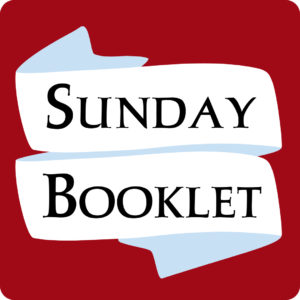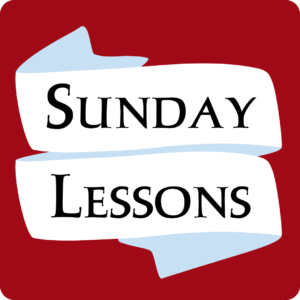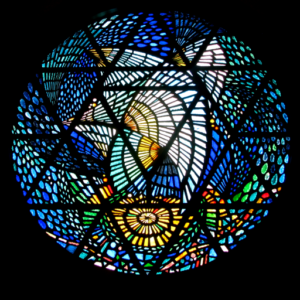Worship Guide for June 8, 2025
During June, July, we will have one service on Sundays at 9am.
Like TV Guide, but from God! Find the text of the Prayers of the People and Sermon below. Use the buttons provided to find other worship materials.
To see the Worship Guide for other weeks, click here.
To see the Book of Common Prayer online, click here.
Prayers
Weekly Prayer Recording:
Prayers of the People:
Prayers of the People:
Day of Pentecost, June 8, 2025
The response to the bidding, “Risen and Ascended Lord:” is “Clothe us with your Spirit.”
Eternal God, as you have received our risen and ascended Lord, fill us with the Holy Spirit, empowering us to carry on the work of raising that which has been cast down and making new that which has grown old.
Risen and ascended Lord: Clothe us with your Spirit.
Lord, in a time of increasing threat of violence at home and war abroad, make us instruments of agitation for the hastening of your peace with justice among us.
Risen and ascended Lord: Clothe us with your Spirit.
We pray for the nation – in a time when violent words fan violent actions, we pray for the Congress and the courts to uphold the integrity of the Constitution and the protection of those who defend the rule of law. We pray for those protected status immigrant communities, legal refugees, and dreamers who are now vulnerable to arbitrary and illegal arrest and deportation. In Pride month we celebrate our solidarity with the Queer Community, especially remembering individuals singled out for discrimination and persecution by government and law enforcement agencies.
Risen and ascended Lord: Clothe us with your Spirit.
We pray for the Church and her life: For Sean, Presiding Bishop, and for Nicholas, our bishop; for Hosam, the Archbishop of Jerusalem; for Pope Leo; for Bartholomew, the Ecumenical Patriarch; and for witness and commitment to service among all Christian leaders.
Risen and ascended Lord: Clothe us with your Spirit.
In a world of increasingly pressing needs, we ask you to forgive our silent complicity in the war crimes being perpetrated upon the helpless people of Gaza and the ethnic cleansing of Palestinian communities in the West Bank. We decry the use of food, water, and medicines as instruments of war as we pray for peace with justice to come to the Middle East.
We continue to pray for a negotiated peace in Ukraine that honors a commitment to Ukrainian sovereignty and future self-determination.
We pray for an end to the civil wars in Sudan, Yemen, and Myanmar. For all forced to flee from their homes and homelands by the violence of war and threats to life and livelihood.
Risen and ascended Lord: Clothe us with your Spirit.
We remember the Earth and the threat of climate change, praying for the strengthening of emergency services and necessary infrastructure to meet the challenge of climate instability. At the beginning of a predicted summer worsening of climate turbulence, we remember communities in the path of wind, fire, and flood.
Risen and ascended Lord: Clothe us with your Spirit.
We pray for all in need and in trouble: for those whose strength is failing through ill health; whose spirits are flagging through depression; whose determination is being sapped through addiction; that they might know God’s comforting presence and healing.
Risen and ascended Lord: Clothe us with your Spirit.
We remember with love those who have asked for our solidarity in prayer: Carol, Mary, Sam, Benjamin, Stefan, Randall, and others we name [pause].
Risen and ascended Lord: Clothe us with your Spirit.
We pray for our own needs, together with those nearest and dearest to us, remembering especially those celebrating birthdays this week: Missy Bennett, Raya Goff, Meg LoPresti, Jeana Whittredge, and Will Morgan.
Risen and ascended Lord: Clothe us with your Spirit.
We remember those we love but see no longer, especially those we name [pause]. And we pray for all who grieve.
Risen and ascended Lord: Clothe us with your Spirit.
Celebrant adds a concluding prayer.
Sermon
Pentecostal Reflections
The Reverend Mark Sutherland
Day of Pentecost
Whitsunday
Year 2025
Sermon Recording:
I remember the amused joy of watching our granddaughter Claire learn to read. As a 3-year-old, she would mimic her parents reading in bed. Lying on their bed, she wanted to show us that she, too, could read a book. She would gabble away to herself in her 3-year-old language, clearly delighting in some gripping yarn, all the while completely oblivious to the fact that she was reading the book upside-down.
When Claire first started reading whole books, I would ask her what she was reading. I’m reading a chapter book, she would reply. I was struck by her response, which described the type of book she was reading rather than its content. By referring to her book as a chapter book, she got me thinking about the nature of a story. Chapters organize the development and progression of more complex stories. That was the point she had grasped; she was no longer reading books with a single, simple story but was now reading books where the story progressed in stages or chapters.
As I continually assert, narratives are the building blocks of meaning. We make sense of the world around us, including making sense of ourselves to ourselves as well as to others through the construction and endless telling of stories.
Constructing a story to make sense of her 3-year-old world was what Claire was doing when she lay on her parents’ bed mimicking their reading. It was irrelevant to her construction of a story that she was holding her book upside down. At 3-years of age, the problem for the rest of us was that only she could understand the story she was making.
The Bible is, in a sense, like one of Claire’s chapter books. It builds the story of God chapter by chapter. Many authors writing from different historical and cultural contexts over an extended timeline make the Bible a rich, complex, and often confusing read. Yet the overarching narrative it tells is the story of our experience of God’s presence within the flow of history.
For Christians, the story of Jesus forms the penultimate section of this long biblical story. The story of Jesus unfolds through the chapters chronicling his birth, life, and ministry, his death and resurrection, culminating in his ascension and the descent of the Holy Spirit, and the birth of the Church as the continuation of Jesus’ ministry in the world.
Continuing with my analogy of the Bible as a chapter book, Pentecost is the final chapter in the Jesus story. In the previous chapter of the story called the Ascension, Jesus, in the fullness of his humanity now perfected through suffering, death, and resurrection, passes through the membrane separating the parallel worlds of Our-Space and God-Space. As parallel dimensions, Our-Space and God-Space occupy the same location in time, although separated by a permeable membrane that allows energy to flow from one to the other. Last week, I used a different analogy: an interdimensional two-way conduit or superhighway to express the same idea of movement between dimensions.
At the Ascension, Jesus passes through the membrane from the dimension of Our-Space to that of God-Space. In doing so, he does not jettison his humanity like a worn-out suit of clothes to don a new divine suit on the other side. In the Ascension, it’s his very humanity now perfected through suffering, death, and resurrection that is embraced and incorporated into the nature of the divine self.
In the present chapter, called Pentecost, energy passes in the opposite direction, i.e., from God-Space to Our-Space. Having received Jesus’ full humanity into the divine nature, the divine spirit is now released back through the membrane, where in Our-Space it empowers us to continue the work begun by Jesus.
There are at least three different ways to talk about the Pentecost event. The first is Pentecost as a highly mystical pyrotechnic event – the 50th day after Easter -focusing on the pyrotechnics of the day: wind, fire, and an experience of instantaneous translation between the speakers of myriad languages as a proclamation of God’s vision of inclusion. The second is as I’ve been doing in this sermon up to now – a story of energy flows between related dimensions, both occupying the exact location in timespace – a Sci-Fi influenced use of imagination alongside the medieval images of the triple-decker universe. The third is a focus on the human fruits of the day itself.
Tom Wright describes Pentecost as:
The moment when the personal presence of Jesus with the disciples is translated into the personal power of Jesus in the disciples.
In Acts, chapter 2, Luke tells the story of the fruits of Pentecost.
Awe came upon everyone, ….All who belonged were together and had all things in common; they would sell their possessions and goods and distribute the proceeds to all, as any had need. Day by day, as they spent much time together in the temple, they broke bread at home and ate their food with glad and generous hearts praising God and having the goodwill of all the people.
His description of the early Christian community is a description of what Our-Space infused with the energies of God-Space might look like – if we allowed it to. Equality and magnetic inclusion become the hallmarks of such a community where the phrase: from all according to ability -to all according to need – is lived out in real time. This produced among the first Christians the most magnetic community, which drew increasing numbers of people into a new way of being human within a new kind of community: one that invested itself in those who had yet to become members.
This image of Christian community frightens us – and so it should! For it stands as a perpetual indictment upon the values and practices that we live by in our own society and which in our present moment are being frighteningly exposed in the corruption of money, privilege, and power now openly celebrated in plain sight.
Luke’s story in Acts 2 raises a serious question for us. Could this vision of transformation and risky living, shaping the first Christian communities, ever become a story we can tell ourselves about our society?
As Episcopalians, we pride ourselves on espousing a tolerant, inclusive Christian vision for a society with greater inclusion and distribution of wealth, but not enough to truly disrupt our societal expectations. While heavy on tolerance and inclusion, we run light on accountability. We like faith as a comfort as long as we can remain undisturbed by its imperatives.
Some of us understand faith as personally life-changing. Some, though perhaps fewer in number, understand that there is a connection between personal transformation and the process of societal change. Nevertheless, most of us expect our faith to let us off lightly by making few demands on us. We do not wish to be made accountable to the imperatives of our faith.
The presence of God’s Spirit in the world of Our-Space demands of us transformation along the lines experienced by the first Christians. They experienced personal change as the catalyst for societal change. To reference Tom Wright again: Pentecost was the moment when the personal presence of Jesus with the disciples is translated into the personal power of Jesus in the disciples.
This Pentecost, the presence in us of the power of the Spirit of Jesus – AKA Holy Spirit – defines our mission. Should we choose to accept it:
-
- We cannot engage in acts of charity towards the less fortunate individuals while failing to confront the systems that deprive them and whole communities of access to the fruits we expect as of right to enjoy.
-
- We cannot reject calls for personal accountability in our communities. Leaving when we feel challenged or uncomfortable might be an option for members of a non-profit, but not for disciples of Christ.
-
- The story we live by tells us we need to feel troubled if the fruits of our own material success blind us to the inequalities in wider society.
-
- We need to stop expecting our faith to insulate us and allow it, instead, to disturb us.
Conclusion
In his poem God’s Grandeur, Gerard Manley Hopkins captures the message of Pentecost – a timeless message which is for us, oh so very timely.
The World is charged with the grandeur of God.
It will flame out, like shining from shook foil;
It gathers to a greatness, like the ooze of oil – crushed.
Why do men then now not reck his rod?
Generations have trod, have trod, have trod;
And all is seared with trade; bleared, smeared with toil and wears man’s smudge and shares man’s smell:
The soil is bare now, nor can foot feel, being shod.
And for all this, nature is never spent;
There lives the dearest freshness deep down things;
And though the last lights off the black West went –
Oh, morning, at the brown brink eastward, springs –
Because the Holy Ghost over the bent
World broods with warm breast and with ah! bright wings.





